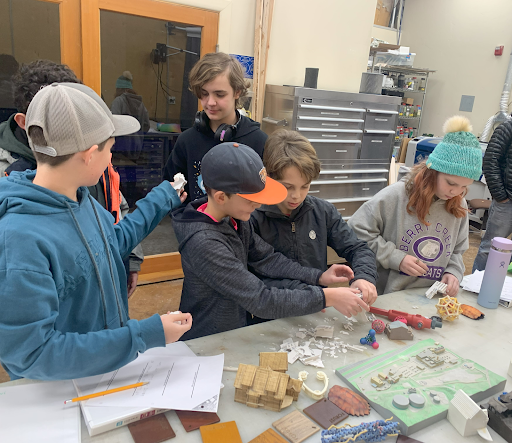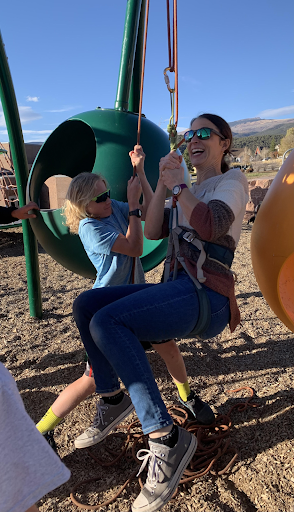
Middle schoolers play with 3D-printed objects on a field trip to LGM Printing.

A participant lifts instructor Stacey Duval in a lesson about pulleys and forces as part of the Natural Disasters session.
The world has a lot of problems, and all of them are solvable—that’s the big lesson kids learn in Walking Mountains after school programs. STEM Curiosity Lab, our program for middle schoolers, helps young people learn about their power to make positive change. Throughout the school year, students wrestle with monumental world challenges and have fun along the way. The conversations range from critical to comical, with serious debates giving way to peals of laughter. We encourage the natural ability of these students, who are just entering young adulthood, to think deeply about the world around them with both gravity and levity. In each session, students learn the ins and outs of an environmental issue and apply STEM skills to create solutions. We strive to facilitate experiences that are fun, practical, and realistic.
With our hands-on, community-based approach, students gain skills they can use today and lay the foundation for future interests. Berry Creek Middle School students recently experimented with combatting fast fashion by refreshing some pre-loved clothes. After learning about the slew of polluting chemicals that fast fashion companies use to dye synthetic fabrics, the participants used a salt mordant (the chemical that helps bind the dye to fibers) and dyes made from beets, cabbages, and onions to give new life to cotton clothes that the thrift store was ready to send to a landfill. Their journey doesn’t stop with reviving old clothes—they also get to think through real-world business models and design processes for new clothes. Many new clothes “are cheaply made to increase sales,” one student observed. Another noted that the way fast fashion companies manufacture clothes “is a waste of supplies.” Next week, the group will be joined by Samantha Hodgkins, founder of SparkFire Active, an activewear company for teenage girls that prioritizes sustainability in a high-tech world. Ms. Hodgkins and her team expertly utilized data, complex math, and laser technology to maximize their manufacturing efficiency. Now, motivated young minds can learn from her expertise to become responsible consumers and inspired entrepreneurs of the future.
We honor young adults’ transition into this world of responsibility by incorporating complexity and compromise into our conversations. When presented with a problem, overly simplistic—though often admirably idealistic—solutions are not enough. Instead, students explore the perspectives of many stakeholders.
Take for example a group at Homestake Peak School who has been examining how humans are contributing to a steady decline in worldwide bird populations. They probed the data and talked with a US Forest Service biologist, and found that cats alone kill billions of birds annually. They considered the perspective of birds, bird-loving people, cats, cat-loving people, and many more direct and indirect stakeholders—a lively debate! They learned that proposing, “Let’s just get rid of all the cats,” wouldn’t cut it. Their goal was to create a solution that provides for cat lovers’ desire for furry friends, cats’ craving to be outside, and birds’ imperative need to survive. That’s why this week, they will start construction on a catio (an outdoor cat enclosure) for a pet cat. One catio may be a small contribution to the solution, but the students are learning that when it comes to big issues, compromise and small steps are the building blocks of big changes.
Eagle Valley Middle School students are also navigating some tough truths, exploring the realities of climate change and the resulting increased frequency and severity of natural disasters. Today’s youth acutely feel climate anxiety, but they can turn worry into empowerment with place-based and globally-oriented lessons during STEM Curiosity Lab. On the local scale, their focus is droughts, floods, and mudslides. They are also engineering architecture that can withstand earthquakes, using ArcGIS to map flood zones affected by sea level rise, and devising town-wide preparedness and response plans. (Those who witnessed the hilarity of a group role-playing a town council meeting were lucky indeed!) Although these natural disasters are daunting, students approach solutions-oriented planning with unwavering optimism. With guidance from our highly skilled instructors, their fresh ideas, creative models, and willingness to learn through trial and error build a culture of constructive hope.
Young people have so much to offer and so much to learn. Whether constructing something new, visualizing data, or talking with experts, students learn to embrace creativity and compromise as a means to address major challenges with realistic solutions. Walking Mountains After School serves as fertile ground for the remarkable potential of young minds to flourish, helping them grow into confident, responsible, and empathetic people who are ready to make a positive impact on the world.
Registration for STEM Curiosity Lab is open! Visit walkingmountains.org/stem and sign up for the session that works best with your schedule.
Written by Lydia Delehanty. Lydia is the Walking Mountains After-School Programs Manager and has a passion for helping young people develop their potential.







